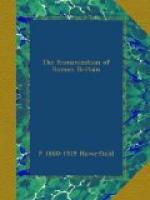LIST OF ILLUSTRATIONS
FIG.
Head of Gorgon from Bath. (From a photograph) Frontispiece
1. The Civil and Military Districts of Britain
2, 3, and 4. Inscribed tiles from Silchester. (From photographs)
5. Inscribed tile from Silchester. (From
a drawing by Sir E. M.
Thompson)
6. Inscribed tile from Plaxtol, Kent, and
reconstruction of lettering.
(From photographs)
7. Ground-plans of Romano-British Temples. (From Archaeologia)
8. Ground-plan of Corridor House, Frilford.
(From plan by Sir
A. J. Evans)
9. Ground-plan of Roman House at Northleigh, Oxfordshire
10. Plan of a part of Silchester, showing the
arrangement of the
private houses and the Forum
and Christian Church. (From
Archaeologia)
11. Painted pattern on wall-plaster at Silchester.(Restoration
by
G. E. Fox in Archaeologia)
12. Plan of British Village at Din Lligwy. (From
Archaeologia
Cambrensis)
13. Late Celtic Metal Work in the British Museum.(From a photograph)
14. Fragments of New Forest pottery with leaf
patterns. (From
Archaeologia)
15. Urns of Castor Ware. (From photographs)
16. Hunting Scenes from Castor Ware. (From Artis, Durobrivae)
17. Fragment of Castor Ware showing Hercules
and Hesione. (After
C. R. Smith)
18. The Corbridge Lion. (From a photograph)
19. Dragon-brooches. (From a drawing by C. J. Praetorius)
20. Inscription from Caerwent illustrating Cantonal
Government.
(From a drawing)
21. Ogam inscription from Silchester. (From a
drawing by C. J.
Praetorius)
Note. For the blocks of the frontispiece, of Figs. 3, 5, 15, 16, I am indebted to the editor and publishers of the Victoria County History. Figs. 6, 11, 14, 20, 21, are reproduced from Archaeologia and the Proceedings of the Society of Antiquaries. For the block of Fig. 10 I have to thank the Royal Institute of British Architects; for the block of Fig. 18, the Society for the Promotion of Roman Studies.
CHAPTER I
THE ROMANIZATION OF THE EMPIRE
Historians seldom praise the Roman Empire. They regard it as a period of death and despotism, from which political freedom and creative genius and the energies of the speculative intellect were all alike excluded. There is, unquestionably, much truth in this judgement. The world of the Empire was indeed, as Mommsen has called it, an old world. Behind it lay the dreams and experiments, the self-convicted follies and disillusioned wisdom of many centuries. Before it lay no untravelled region such as revealed




